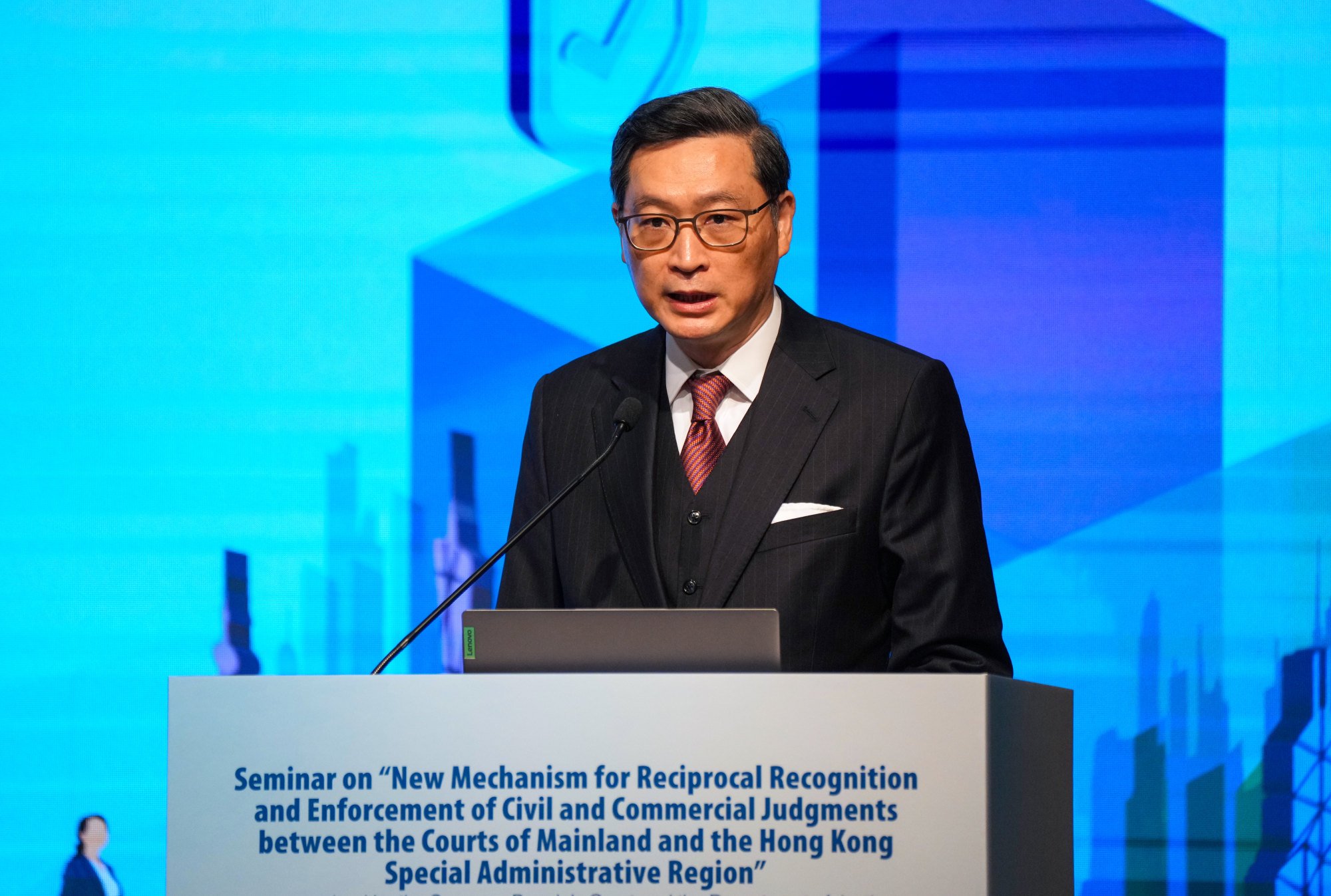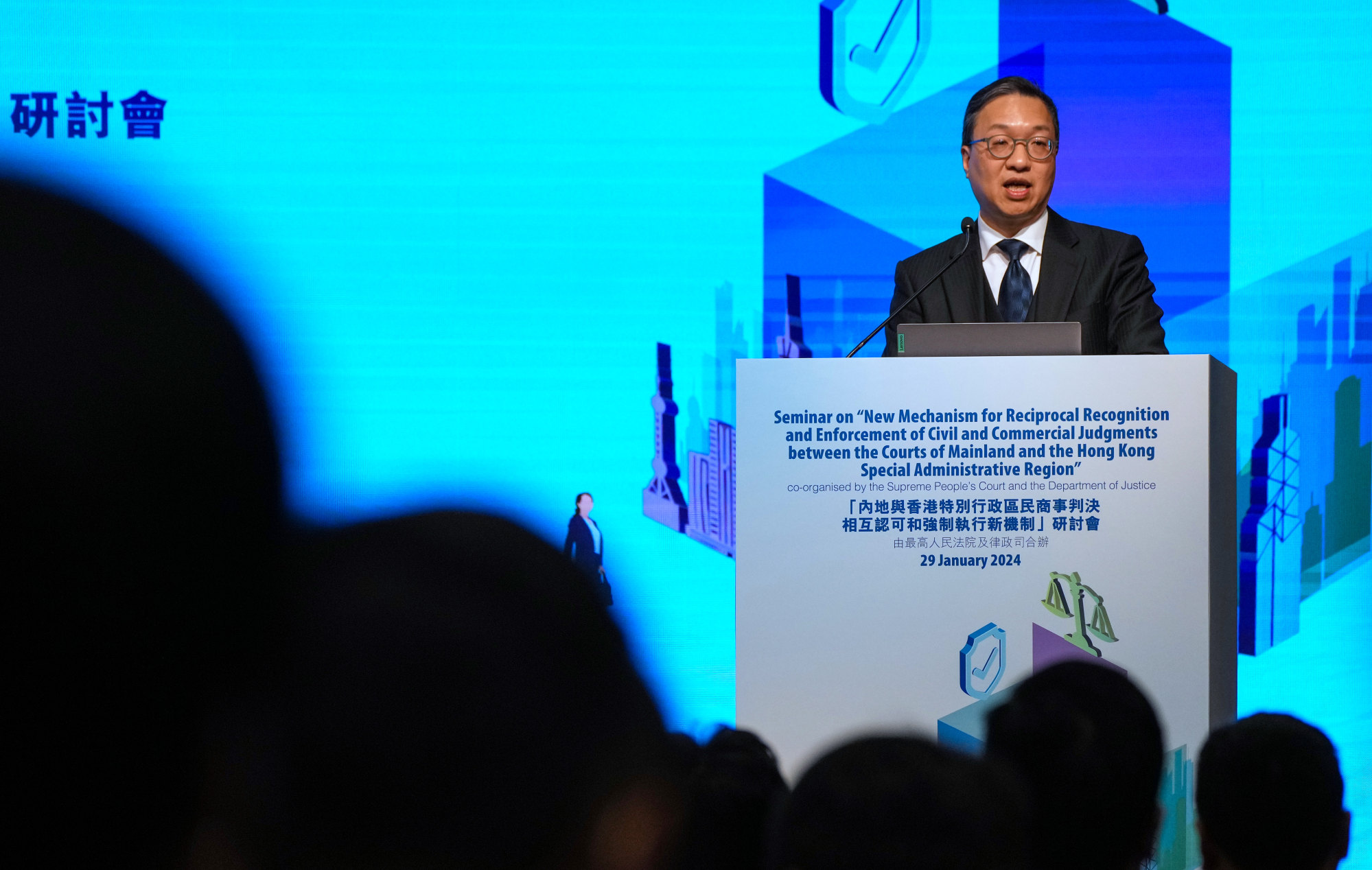
New reciprocal enforcement law for Hong Kong, mainland China rulings will secure city’s role as global financial hub, top judge says
- Chief Judge Jeremy Poon says judgments will not be automatically recognised or enforced mutually
- ‘It will enhance public confidence in the legal system, facilitate economic integration and development, and optimise business,’ he adds
A new arrangement allowing courts in Hong Kong and mainland China to reciprocally enforce judgments in civil and commercial cases will strengthen the city’s status as an international financial centre, a top judge has said, reassuring businesspeople that rulings from across the border will not be automatically imposed locally.
Chief Judge Jeremy Poon Shiu-chor of the High Court downplayed concerns as the new cross-border law came into force on Monday, with Secretary for Justice Paul Lam Ting-kwok also hailing the legislation for making the city a more attractive option among international business communities to resolve contractual disputes on the mainland.
The Mainland Judgments in Civil and Commercial Matters (Reciprocal Enforcement) Ordinance has widened the scope of existing legislation to cover civil and commercial matters for reciprocal recognition and enforcement of judgments by courts across the border.

During a seminar organised by the Department of Justice to introduce the new law, Poon said the arrangement would help save time, costs and resources, and reduce uncertainty and stress associated with re-litigation.
“It will enhance public confidence in the legal system, facilitate economic integration and development, and optimise the business environment underpinned by the rule of law for both the mainland and Hong Kong,” he said.
“I must stress, it does not mean that judgments will be automatically recognised or enforced mutually,” he added, citing the procedural steps and the possibility of refusal of enforcement as allowed under the law.
Lawyers: two-way enforcement for Hong Kong, mainland legal rulings good move
The new ordinance says cross-border enforcement may be refused if the relevant party is not given a reasonable opportunity to defend the action, if the mainland judgment is obtained by fraud or if the parties start legal proceedings in Hong Kong before a mainland court takes on the case.
Poon argued the new arrangement underscored the unique strengths of Hong Kong under the “one country, two systems” principle and would help the city strive as an international financial centre and dispute resolution hub in the region.

Speaking at the same occasion, justice minister Lam stressed Hong Kong was the only jurisdiction with such an agreement with the mainland and argued it would enhance the city’s status as an international legal services centre.
He also said it would be beneficial to the business community and others involved in cross-border civil and commercial disputes.
Hong Kong justice minister defends courts’ impartiality in national security cases
Yang Wanming, vice-president of the Supreme People’s Court, said at the event that the new law would strengthen Hong Kong’s role as a “superconnector” to ease the alignment of different legal systems.
“It will also help Hong Kong better integrate into the mainland’s development as more mainland investors will be encouraged to turn to Hong Kong for stepping into the world market,” he said.
According to Yang, the mainland and Hong Kong have now signed nine judicial cooperation arrangements to date, achieving comprehensive coverage of judicial assistance in the civil and commercial fields.

The new ordinance came into force five years after a consultation paper was issued.
Concerns that assets in Hong Kong would automatically be confiscated by mainland authorities have since surfaced, at a time when the city government has been working to attract new investment and talent to boost the economy amid a muted post-pandemic recovery. Lam debunked the suggestion again in a social media post on Sunday.
Hong Kong General Chamber of Commerce legal committee chairman Nick Chan Hiu-fung said the majority of its members had not expressed concerns about the law.
Hong Kong’s own national security law ‘essential’ to keep Beijing’s trust in city
Under the Foreign Judgments (Reciprocal Enforcement) Ordinance, judgments from about 15 jurisdictions are enforceable in Hong Kong, which include court decisions from Australia, Singapore and France.
Common law applies as the legal framework for the recognition and enforcement of foreign judgments in the city for other jurisdictions.

